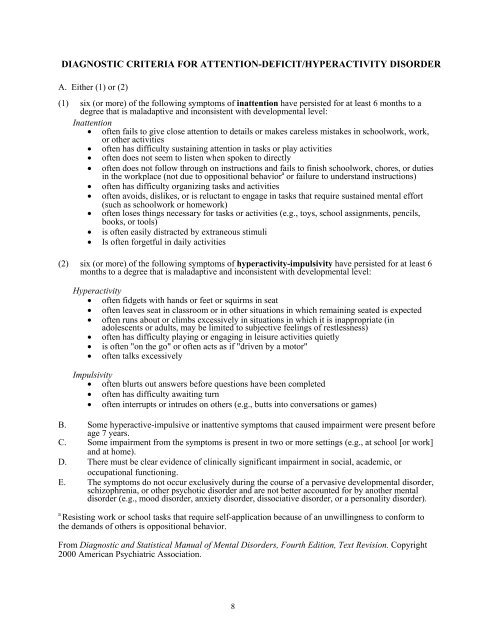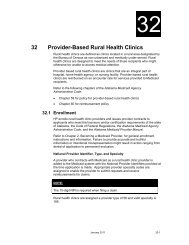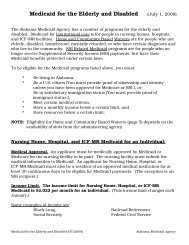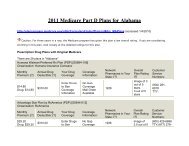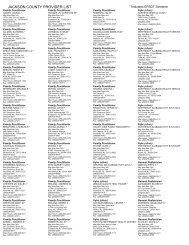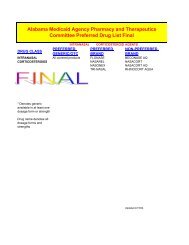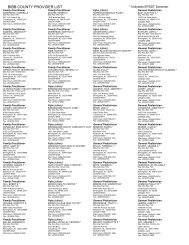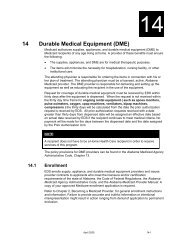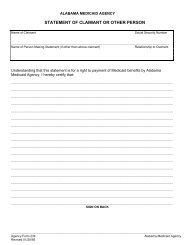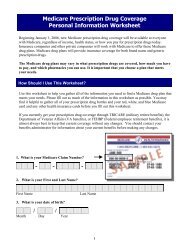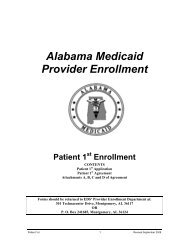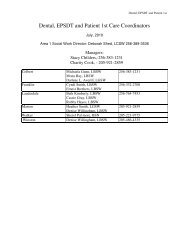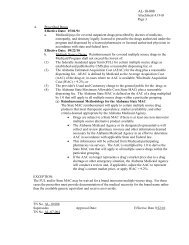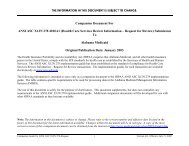PHARMACOTHERAPY REVIEW CNS STIMULANTS for treatment of ...
PHARMACOTHERAPY REVIEW CNS STIMULANTS for treatment of ...
PHARMACOTHERAPY REVIEW CNS STIMULANTS for treatment of ...
Create successful ePaper yourself
Turn your PDF publications into a flip-book with our unique Google optimized e-Paper software.
DIAGNOSTIC CRITERIA FOR ATTENTION-DEFICIT/HYPERACTIVITY DISORDERA. Either (1) or (2)(1) six (or more) <strong>of</strong> the following symptoms <strong>of</strong> inattention have persisted <strong>for</strong> at least 6 months to adegree that is maladaptive and inconsistent with developmental level:Inattention• <strong>of</strong>ten fails to give close attention to details or makes careless mistakes in schoolwork, work,or other activities• <strong>of</strong>ten has difficulty sustaining attention in tasks or play activities• <strong>of</strong>ten does not seem to listen when spoken to directly• <strong>of</strong>ten does not follow through on instructions and fails to finish schoolwork, chores, or dutiesin the workplace (not due to oppositional behavior a or failure to understand instructions)• <strong>of</strong>ten has difficulty organizing tasks and activities• <strong>of</strong>ten avoids, dislikes, or is reluctant to engage in tasks that require sustained mental ef<strong>for</strong>t(such as schoolwork or homework)• <strong>of</strong>ten loses things necessary <strong>for</strong> tasks or activities (e.g., toys, school assignments, pencils,books, or tools)• is <strong>of</strong>ten easily distracted by extraneous stimuli• Is <strong>of</strong>ten <strong>for</strong>getful in daily activities(2) six (or more) <strong>of</strong> the following symptoms <strong>of</strong> hyperactivity-impulsivity have persisted <strong>for</strong> at least 6months to a degree that is maladaptive and inconsistent with developmental level:Hyperactivity• <strong>of</strong>ten fidgets with hands or feet or squirms in seat• <strong>of</strong>ten leaves seat in classroom or in other situations in which remaining seated is expected• <strong>of</strong>ten runs about or climbs excessively in situations in which it is inappropriate (inadolescents or adults, may be limited to subjective feelings <strong>of</strong> restlessness)• <strong>of</strong>ten has difficulty playing or engaging in leisure activities quietly• is <strong>of</strong>ten "on the go" or <strong>of</strong>ten acts as if "driven by a motor"• <strong>of</strong>ten talks excessivelyImpulsivity• <strong>of</strong>ten blurts out answers be<strong>for</strong>e questions have been completed• <strong>of</strong>ten has difficulty awaiting turn• <strong>of</strong>ten interrupts or intrudes on others (e.g., butts into conversations or games)B. Some hyperactive-impulsive or inattentive symptoms that caused impairment were present be<strong>for</strong>eage 7 years.C. Some impairment from the symptoms is present in two or more settings (e.g., at school [or work]and at home).D. There must be clear evidence <strong>of</strong> clinically significant impairment in social, academic, oroccupational functioning.E. The symptoms do not occur exclusively during the course <strong>of</strong> a pervasive developmental disorder,schizophrenia, or other psychotic disorder and are not better accounted <strong>for</strong> by another mentaldisorder (e.g., mood disorder, anxiety disorder, dissociative disorder, or a personality disorder).aResisting work or school tasks that require self-application because <strong>of</strong> an unwillingness to con<strong>for</strong>m tothe demands <strong>of</strong> others is oppositional behavior.From Diagnostic and Statistical Manual <strong>of</strong> Mental Disorders, Fourth Edition, Text Revision. Copyright2000 American Psychiatric Association.8


